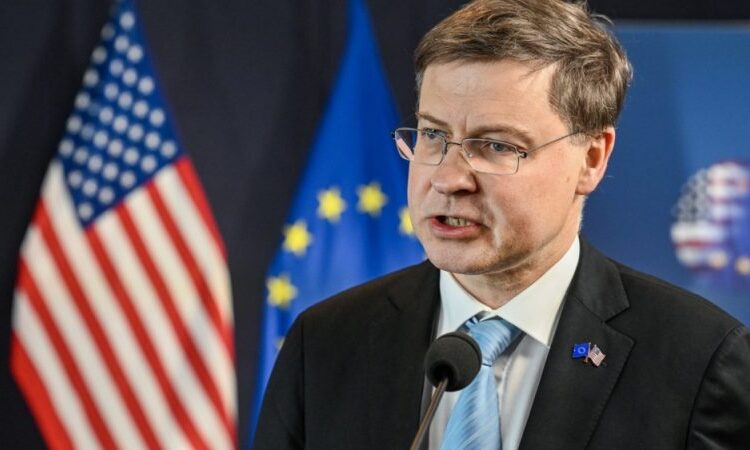
EU trade ministers reaffirmed their support for free trade on Thursday (30 May) despite signals from a top US trade official the previous day that Washington will not rely on market mechanisms only but also pursue state-driven policies.
Talking about EU trade competitiveness at the Foreign Affairs Council in Brussels on Thursday morning, trade chiefs reinstated the bloc’s commitment to free trade principles – with European Commission Executive Vice-President Valdis Dombrovskis saying that “openness to trade” has contributed to “very substantial global economic development and has helped lift millions of people out of poverty”.
“Trade will continue to play a very important role for EU’s competitiveness and prosperity,” he noted, adding that the EU should nevertheless be “mindful” of trade’s potentially “harmful” impact on the environment and labour rights.
Belgian Foreign Minister Hadja Lahbib, whose country currently holds the presidency of the Council of the EU, similarly highlighted the need for the EU to pursue “an open, proactive and ambitious trade policy”.
Dombrovskis was answering a question from Euractiv about US Trade Representative Katherine Tai’s remarks on Wednesday that “deferring to the market has its limits” and unrestricted free trade ultimately harms workers, which reinforced recent signals from the US that the country is pursuing a more aggressive trade strategy.
Chinese electric vehicles remain an open question
Regarding the ongoing anti-subsidy probe by the European Commission into Chinese electric vehicles (EVs), which might lead to new import duties being imposed, Dombrovskis said it was “not decided yet” when such measures could be announced.
While many observers expected a decision on the politically-hot topic to be announced before June’s European elections, German newspaper SPIEGEL reported on Wednesday that the announcement had been postponed until after the election.
German transport minister Volker Wissing told Euractiv on Wednesday that a possible EU move to impose tariffs on Chinese cars as a consequence of the Commission’s investigation could prove short-sighted, as the aim should be to “create fair competition instead of working to hinder it” with tariffs.
The EV investigation – just one of many anti-subsidy probes launched by the European Commission against Beijing in recent months – comes amid rising trade tensions between China and its EU and US counterparts – the country’s two largest trade partners after the southeast Asia region.
Earlier this month, the US introduced tariffs on a range of Chinese products, including solar panels and electric vehicles, with the stated aim of protecting the US economy from Beijing’s “unfair trade practices”.
The US decision elicited an angry reaction in Beijing. “Some people in the US have lost their sanity in order to safeguard their unilateral hegemony,” Chinese Foreign Minister Wang Yi was quoted by Bloomberg as saying.
China responded to the EU probes in January this year by launching its own investigation into the alleged “dumping” of European brandy on the Chinese market.
In a speech delivered in November last year, International Monetary Fund (IMF) Deputy Managing Director Gita Gopinath said that Europe’s openness to trade and investment means that it is “uniquely exposed” to the world’s growing geopolitical fragmentation.
[Edited by Anna Brunetti/Chris Powers]







